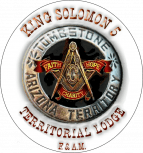
Why is the name KS 5 TL?
We have been asked why the name of our lodge is written “King Solomon No. 5 Territorial Lodge” and not “King Solomon Lodge No. 5”, “King Solomon Territorial Lodge No. 5”, or “King Solomon No. 5 Lodge”, etc. The following statute will explain the reason.
Constitution and Statutes of the Most Worshipful Grand Lodge of Free and Accepted Masons of Arizona: Section 10-301 – Territorial Lodges. All Lodges that were chartered before Arizona Statehood to be known as ”Territorial Lodges” and to optionally wear on their aprons the letters “A.T.” (“Arizona Territory”) and the year in which the Lodge was chartered. The designation “Territorial Lodge” shall be attached to the number, and not to the name or to the location of a lodge.
THE TITLE “FREE AND ACCEPTED”
How did the term “Free and Accepted” originate? Ancient craftsmen were very skilled, and their craft was considered to be indispensable to the welfare of both “Church” and “State.” For this reason, they were not placed under the same restrictions as were other workers – they were “free” to do their work, travel and live their lives in a manner befitting their importance. In England during the middle Ages this freedom was rare. Most workers were under bond to the owners of the land on which they worked. Our legendary history carries this freedom for the Operative Mason back to the year 946, in York, England.
The word “Accepted” also goes back to the time of the operative mason. During the latter years of the middle Ages, there were few educated men outside the monasteries of the world. Naturally, men wanted to become Freemasons to obtain the advantages the craft had to offer. These men did not necessarily want to build buildings; they wanted to belong to the organization. These were “Accepted” Masons, rather than operative masons. This practice probably originated when some of the people for whom the craftsmen were working asked to be admitted. This was an important transition for the Craft, because the secrets of the building trades were becoming more widely known, architecture was changing and membership was declining. By becoming “Speculative,” the Craft grew rapidly. As time went on, there became many more “Accepted” members than there were operative members, and eventually we became a Speculative rather than an operative organization.
Sign of Fidelity (optional)
The sign of fidelity is not mentioned in the Arizona Constitution or Ritual. No Mason is required to use it. Whereas the sign of fidelity is generally accepted and used in many Lodges, the following guidelines are suggested for Masons that choose to employ it.
- (A) How? The right arm across the left breast.
- (B) When used?
Master: In requesting the Pledge of Allegiance; draping the charter and requesting a moment of silence for a departed Brother; closing the lodge (thus Brethren) and all obligations.
Chaplain: Prayers at the Altar; at the grave (MM); for Evening Memorial Services and funerals; blessing at meals. Senior Deacon: At the Altar for opening and closing the Lodge or rearranging the three Great Lights..
Acknowledgement of one’s appreciation. - (C) The right arm is dropped when the Chaplain or Master says Amen. The Master or the Senior Deacon rises from the Altar.
What does it mean when someone is a 32° mason?
There are only “three degrees” in the Masonic hierarchy. A Freemason who has been raised to the third degree (Master Mason) has attained the highest level of Freemasonry. All Master Masons are peers, though some hold other offices (such as Worshipful Master of a Lodge, District Deputy Grand Master, or similar). No one ever ‘rises higher’ than the third degree.
The only time a Mason might write his name followed by 32° or 33°, is for Scottish Rite business. There is no such thing as a 32° Mason or a 33° Mason. It is recommended that if you feel it is important to impress a listener or reader that you are something more than a Master Mason, then it is suggested to qualify your identity as “32° SCOTTISH RITE Mason.” If this is not done, than the profane might consider you more important, more knowledgeable, or look on you as one with more secrets than a 3° mason. Unless of course, this is what you intended!!!
